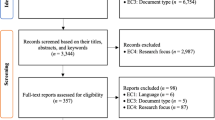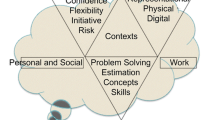Abstract
Data from a study of the practices of research mathematicians are used to highlight an exploration of commonalities across and differences between learners in mathematics classrooms. Such commonalities and differences are, it is claimed, central to a teacher's understandings of how to address her role and responsibilities. Commonalities discussed are those between learners,across mathematics and between communities of practice. Differences between syllabus and practice, between school mathematics,mathematics in the world, and academic mathematics and, finally, between members of the different communities of students,teachers of mathematics, mathematics educators, and mathematicians are explored.
Similar content being viewed by others
REFERENCES
Burton, L.: 1995, ‘Moving towards a feminist epistemology of mathematics’, Educational Studies in Mathematics 28, 275–291.
Burton, L.: 1999a, ‘The practices of mathematicians: What do they tell us about coming to know mathematics?’ Educational Studies in Mathematics 37, 121–143.
Burton, L.: 1999b, ‘Why is intuition so important to mathematicians but missing from mathematics education?’ For the Learning of Mathematics 19.3, pp. 27–32.
Burton, L.: 2001, ‘Research mathematicians as learners - and what mathematics education can learn from them’, British Educational Research Journal, 27.5, 589–599.
Ernest, P.: 1998, ‘The culture of the mathematics classroom and the relations between personal and public knowledge: an epistemological perspective’, in F. Seeger, J. Voigt and U. Waschesco (eds.), The Culture of the Mathematics Classroom, Cambridge University Press, Cambridge, pp. 245–268.
Fischbein, E.: 1987, Intuition in Science and Mathematics: An Educational Approach, D. Reidel, Dordrecht.
Gale, T. and Densmore, K.: 2000, Just Schooling: Explorations in the Cultural Politics of Teaching, Open University Press, Buckingham, UK.
Hersh, R.: 1998, What is Mathematics, Really? Vintage Books, London.
Holland, D., Lachicotte Jr, W., Skinner, D. and Cain, C.: 1998, Identity and Agency in Cultural Worlds, Harvard University Press, Cambridge, MA.
Lave, J. and Wenger, E.: 1991, Situated Learning: Legitimate Peripheral Participation, Cambridge University Press, Cambridge.
Lerman, S.: 1999, ‘Culturally situated knowledge and the problem of transfer in the learning of mathematics’ in L. Burton (ed.), Learning Mathematics: From Hierarchies to Networks, Falmer Press, London, pp. 93–107.
Luelmo, M.J., Jimenez, M.A. and Velazquez, F.: 1994, ‘Chapter 10: Spain’ in L. Burton (ed.), Who Counts? Assessing Mathematics in Europe, Trentham Books, Stoke-on-Trent, UK, pp. 221–240.
Marton, F. and Booth, S.: 1997, Learning and Awareness, Lawrence Erlbaum Associates, Publishers, Mahwah, NJ.
Mason, J., Burton, L. and Stacey, K.: 1982, Thinking Mathematically, Addison-Wesley, Harlow Essex.
Paechter, C.: 2000, Changing School Subjects: Power, Gender and Curriculum, Open University Press, Buckingham UK.
Stevens, R.: 2000, ‘Who counts what as math? Emergent and assigned mathematics problems in a project-based classroom’, in J. Boaler (ed.), Multiple Perspectives on Mathematics Teaching and Learning, Ablex Publishing, Westport, CT, pp. 105–144.
Wenger, E.: 1998, Communities of Practice: Learning, Meaning, and Identity, Cambridge University Press, Cambridge.
Wilder, R.L.: 1984, ‘The role of intuition’, in D.M. Campbell and J.C. Higgins (eds.), Mathematics: People, Problems, Results, Vol II, Wadsworth International, Belmont, CA, pp. 37–45.
Author information
Authors and Affiliations
Rights and permissions
About this article
Cite this article
Burton, L. Recignising commonalities and reconciling differences in mathematics education. Educational Studies in Mathematics 50, 157–175 (2002). https://doi.org/10.1023/A:1021158009837
Issue Date:
DOI: https://doi.org/10.1023/A:1021158009837




